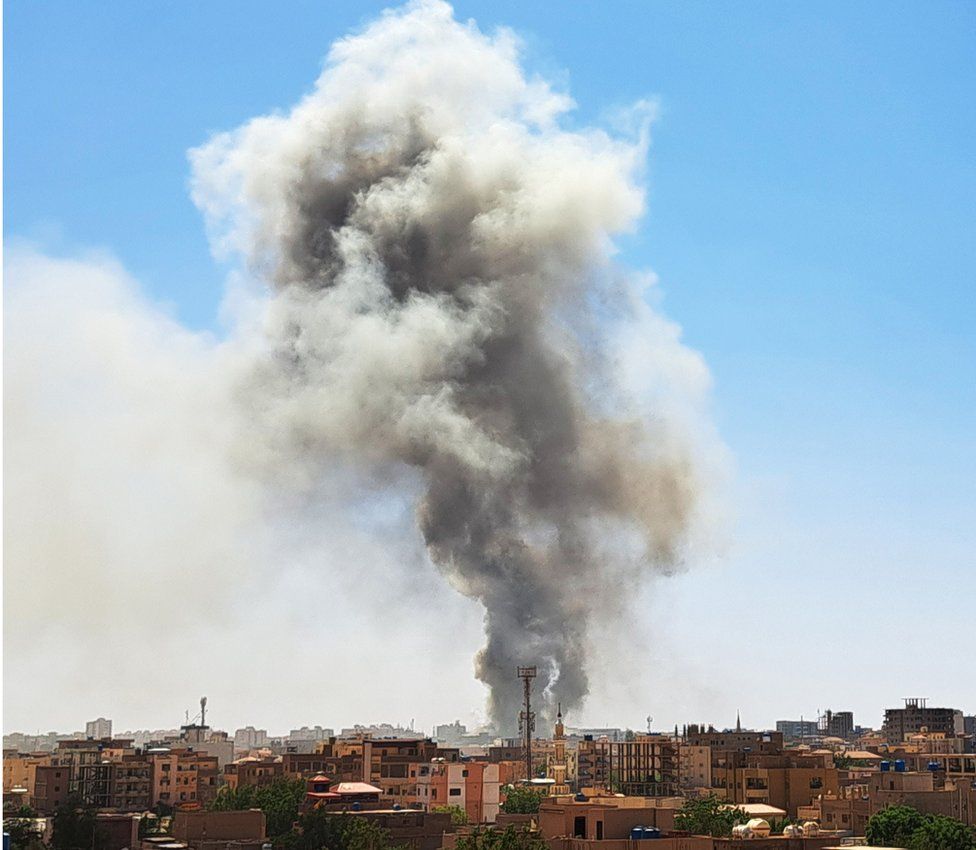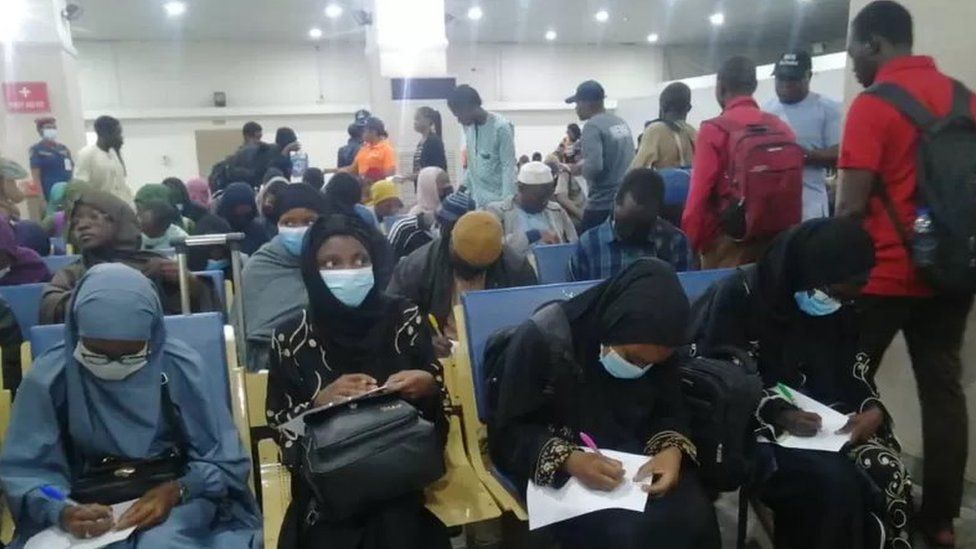Sudan fighting: The Nigerian footballer who fled in his shorts
Charles Collins was looking forward to his next match in the Sudan Premier League when fighting broke out in the country on 15 April, turning the city where he lived into a war zone.
The 28-year-old Nigerian footballer, who plays for Khartoum side Haidob en Nahud, said he had to leave all his possessions behind, fleeing in just the black shorts he was wearing, when battles between the army and a powerful paramilitary group reached his neighbourhood of the Sudanese capital.
He was among 396 Nigerians who flew back to Abuja from Egypt this week, after escaping from Sudan in what many described as a dangerous journey lasting several days.
"I am coming back home with just this, just my blanket," he told the BBC at Abuja's international airport, swivelling to reveal a black backpack.
"I ran out of my house wearing just shorts, it was a terrible experience," he said.
Haidob, who were only promoted to the premier division this season, were on course to qualify for the Caf Confederations Cup - Africa's second most prestigious competition.
The team lost 1-0 to Kober SC Bhari just a week before fighting started but remained in fourth place in the now-halted league.
But after what he went through, Collins does not see himself going back to Sudan to continue his career.
A handful of footballers from Nigeria's top-flight division have transferred to Sudan over the years, finding the top clubs that play in continental competitions attractive.
'It was a terrible experience'
Collins, who has been in Sudan for three-and-a-half years after arriving from Mauritius club Richie Moore Rovers, said he lost everything he owned in the country, including $20,000 (£16,000) cash.
He was combining football with some business on the side, importing hair extensions into the country for sale and had taken delivery of a shipment eight days before the fighting broke out, which is now lost.
"There are many who came back with nothing. At least I came back with a blanket," he said on arrival in Abuja, pointing to a man with a black polythene bag.
"He came back with just his food."
The evacuees were airlifted in two planes - one from Nigerian commercial carrier Air Peace and a military aircraft - from Aswan in neighbouring Egypt. They had been stranded for days at the Egyptian border because of problems with their visas.
Before the fighting broke out, more than 5,000 Nigerians were believed to reside in Sudan, mostly students. The country is famous for its Islamic Studies and Classical Arabic, which many Nigerians were studying.
Its affordable pharmacy and medicine colleges were also popular with Nigerians.
There were joyous scenes at Abuja's airport as the evacuees were met by family members and government officials.
However, the trauma is still fresh.
"It was a terrible experience throughout the journey," Zainab Abdulqadir, a student, told the BBC.
She said that her leg was swollen from sitting all night in a car as they escaped Sudan without water or food.
"It was a situation of extreme tension, fear and instability," she said.
Abdulazez Muiza, a student at the Africa International University in Khartoum, which is popular with Nigerians, said she mistook the first gunshots for electric sparks on the day fighting started.
"It was so stressful, some of us were pregnant… but we thank God that we are back home."
Ms Muiza, a first-year student, said she hopes to return to Sudan when the fighting is over.
Sudan's ambassador to Nigeria, Muhammad Yusuf, has also pleaded with Nigerians returning from the conflict-hit country to consider returning once peace returns.
He asked them to consider Sudan as their second country, expressing optimism that the fighting would be controlled soon.
"I'm very sorry for what is happening there but at the same time I'm very happy to have these evacuees coming from Sudan safe, no life is lost," he was quoted by the Cable newspaper as saying.
Sadiya Farouk, the minister of humanitarian affairs and disaster management, said each returnee would be given $200 (£160) to enable them to settle back home.
Nigeria had deployed 40 luxury buses to take the evacuees to Egypt from where they could be airlifted back home.
But it is not clear how many of the 5,000 students will be evacuated to Nigeria, as some had already made their own plans, crossing into neighbouring countries.
Many of the student-evacuees said they would consider enrolling in Nigerian universities to continue their education, but Collins does not have that luxury.
"I don't know what I am going to do," he said.
"But I am happy to be back, it was a terrible experience."






Comments
Post a Comment